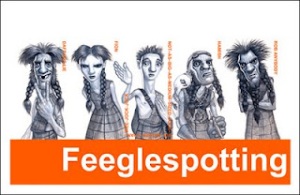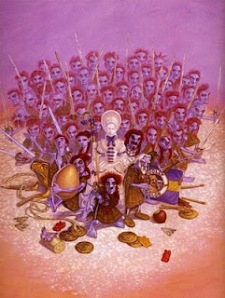THE WEE FREE MEN, by Terry Pratchett, published in 2004
Bookcase 3, shelf 8, book 16
Well, that’s a bit of a change from the last book!
 Before anything else, a confession. Until a few years ago, I’d not read a word of Terry Pratchett. That was because I knew I wouldn’t like him, right?
Before anything else, a confession. Until a few years ago, I’d not read a word of Terry Pratchett. That was because I knew I wouldn’t like him, right?
Then all my books were in storage, and I was living in a friend’s house for six months. I had to read the books already on the shelves or bankrupt myself, and I was ‘reduced’ to Pratchett. Within half an hour I knew I’d been making a terrible mistake for years, blinded by stupid prejudice and ridiculous assumptions about genre. His books are wonderful.
But, but, but – I’m still not a huge fan of the earlier books, and there are inevitably some weaker ones (Monstrous Regiment went to a charity shop). I prefer the later Pratchett, the angry Pratchett, the Pratchett of the Night Watch. I wondered what I would do if the dice gave me a Pratchett I didn’t particularly like – admit it, or loyally defend it with qualifications? Happily, they didn’t. I got this.
It’s ostensibly a children’s book, following on from his award-winning Amazing Maurice and his Educated Rodents. But this is darker, fitting in more with the overall atmosphere of Discworld. It centres on Tiffany Aching:

a child who is something of an anomaly in her family, having a deep respect for learning (she reads the dictionary for pleasure) and being a witch in the making. In this she is most closely linked with her recently-deceased grandmother, a shepherd of outstanding ability and status. Tiffany sees things as they really are, not as they ought to be. So when she sees a horrifying monster in the river she knows it is real and reacts appropriately. That means using her sticky baby brother as bait (that’s the ruthless witchiness coming out) and whacking the river-sprite – who is similar to a classic British folk horror – with an iron frying pan. This not surprisingly attracts attention, but the watchers are surprising: some of Pratchett’s most wonderful creations, the Nac Mac Feegle, or the Wee Free Men.

Apart from uttering cries of ‘Crivens! or ‘Oh, waily, waily, waily!’, I’m not sure how to describe the NMF. Hm. They’re wonderful. They’re diminutive fairies, except they don’t have wings, they have tattoos; they don’t tend to do good things unless there’s no other option or they’ve been bribed by promises of Special Sheep Liniment; they’re not cute or twee, they’re Glaswegian. They were thrown out of Fairyland, possibly for being drunk and disorderly. The Feeglespotting poster above, by Paul Kidby – whose illustrations of Discworld I absolutely love – comes from The Art of Discworld, where Pratchett comments ‘The Wee Free Men was launched in Inverness, to see if I survived. I did.’
Let’s whip through a bit of plot. Tiffany’s sticky brother disappears; he’s been knidnapped by the Queen of the Elves in one of her repeated attempts to invade the Discworld; she also invades dreams. Pratchett’s elves are nothing like Tolkien’s; they are immensely dangerous, self-centred beyond belief and wickedly tricksy. Tiffany, aided by the NMF, advice from Miss Tick (itinerant teacher and witch), Miss Tick’s ‘familiar’ (a helpful toad – he’s yellow because he’s unwell, but the actual pun is avoided, thank heavens), and her own natural good sense, sets off to rescue him. Which… no, no plot spoilers… it’s not a long book; read it to find out what happens.
But that’s just the plot. For me the main themes are more to do with being true to yourself, dealing with bereavement and understanding the power of the land. The high chalk, Tiffany’s country, is almost another character, a perpetual presence which is powerfully described. Pratchett says that ‘there’s a lot of my past in some of the descriptions in the book’, and you can tell. Let’s hope that’s mainly confined to his wonderful descriptions of the landscape, and not to any personal acquaintance with any small, aggressive, smelly (Tiffany makes them bathe), kilted and armed pictsies [sic]…

‘Nae quin! Nae king! Nae laird! Nae master! We willna’ be fooled again!’

Very much enjoyed this! Especially as the Terry Pratchett books were mine, I assume. Wincanton, in Somerset, is twinned with Ankh Morpork, and is very close to the upland chalk that he describes so well.
They were indeed yours, but you’d got some gaps so I spent rather too much money in Browsers supporting my local bookshop…
I’ve never been to Wincanton but I shall think of it in a new light. I sincerely hope there’s a Guild of Assassins…